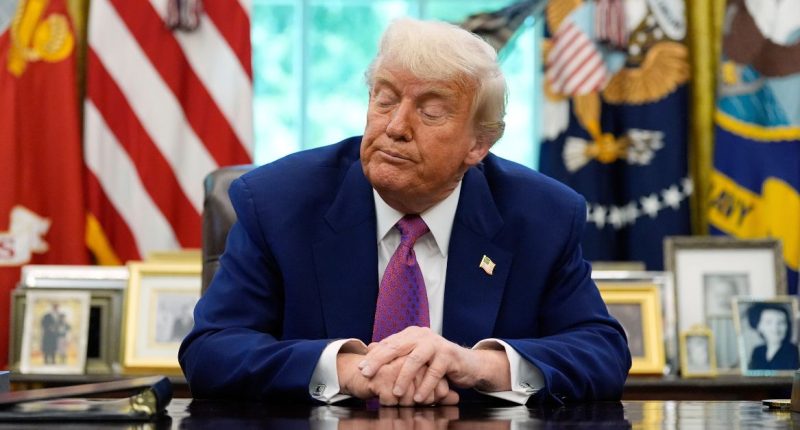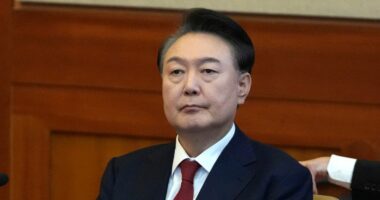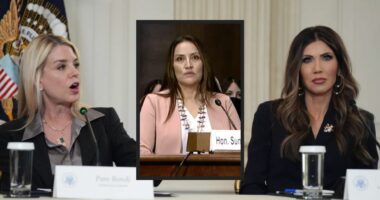Share this @internewscast.com
President Donald Trump pauses as he speaks in the Oval Office of the White House, Tuesday, May 20, 2025, in Washington (AP Photo/Alex Brandon).
A California judge on Thursday prohibited the Trump administration from revoking the legal status of international students at universities nationwide. Employing strong language, the court consistently criticized the government for its conduct in five consolidated cases.
In his 21-page order, U.S. District Judge Jeffrey White, appointed by George W. Bush, epitomized the immigration dispute as an example of the government attempting to “move fast and break things.”
From the beginning, the judge lamented the “instinct that has become prevalent in our society to effectuate change” in a general sense. He later expressed specific disapproval of the government’s apparent attempts to evade the court system’s scrutiny of its actions against students.
“That instinct must be checked when it conflicts with established principles of law,” White writes. “If those charged with administering the laws are unwilling to do so, our system of checks and balances permits the judiciary to act.”
Love true crime? Sign up for our newsletter, The Law&Crime Docket, to get the latest real-life crime stories delivered right to your inbox.
In the case, commonly stylized as S.Y. v. Noem, the plaintiffs, roughly two dozen students, sued over an April decision by Immigration and Customs Enforcement (ICE) to terminate their legal status under the Student and Exchange Visitor (SEVIS) program.
The students were told by ICE that they were shifted to inactive for “otherwise failing to maintain status.” This abrupt change occurred without any prior notification and, the students claim, “rendered their presence in the United States unlawful,” the judge explains.
That policy has so far impacted several thousand students.
The litigation itself is filed as a challenge under the Administrative Procedure Act (APA), the broad statute governing agency actions, as well as the due process clause of the U.S. Constitution.
The government, for its part, has repeatedly backtracked and changed course since a raft of lawsuits were filed by various students who sought and received temporary restraining orders in April.
The court runs through those shifting sands, noting that the consolidated cases came up for a combined hearing on April 25.
That same day, the court noted, the government “abruptly” changed its tune. At the hearing, the government announced a new policy that SEVIS records had been reinstated, and that ICE would keep those records active “[u]ntil such a policy is issued.” The next day, ICE issued the new policy: a list of reasons for SEVIS terminations. Then, during a hearing for preliminary injunctions on May 14, the government said ICE would be “restoring SEVIS records retroactively to the date the records were terminated” and would also “send letters” to every student caught up in the mass termination dragnet. This, the court complains, was “yet another new development.”
All of those changes, substantial reversals and permutations alike, in such a short span, appear to have convinced the court that the Trump administration is actually engaged in subterfuge.
“Defendants’ actions since these cases were filed raise the concern that they may be trying to place any future SEVIS terminations beyond judicial review,” White’s order reads. “At each turn in this and similar litigation across the nation, Defendants have abruptly changed course to satisfy courts’ expressed concerns. It is unclear how this game of whack-a-mole will end unless Defendants are enjoined from skirting their own mandatory regulations.”
The court offers a strongly worded public policy critique of the Trump administration’s campaign against international students, calling it a “uniform policy that uniformly wreaked havoc not only on the lives of Plaintiffs here but on similarly situated F-1 nonimmigrants across the United States.” The judge also says the policy “continues to do so.”
White notes that several students have individually challenged the government on their SEVIS revocations — but frames the case before him as an urgent one requiring broader and prophylactic resolution.
To that end, the court entered a nationwide injunction barring the government from using any legal status concerns to arrest or incarcerate the plaintiffs in any pending cases or any “similarly situated” students. The order additionally bars the government from moving such individuals “outside the jurisdiction of their residence” pending the full resolution of the litigation. The government is also specifically barred from reversing the reinstatement of international students’ SEVIS records and broadly barred from “imposing any adverse legal effect” due to prior SEVIS terminations.
The judge says a nationwide injunction is necessary due to repeated violations of the APA, and the resulting harms those violations have caused and likely will continue to cause.
“Unlike the letter Defendants intend to send, the relief the Court grants provides Plaintiffs with a measure of stability and certainty that they will be able to continue their studies or their employment without the threat of re-termination hanging over their heads,” the order reads.
White makes short shrift of the Trump administration’s already-registered complaints about the extent of the relief granted.
“Defendants argue the Court has no authority to prevent Defendants from arresting, incarcerating, or transferring the Plaintiffs outside the District pending resolution of the proceedings,” the order continues. “The Court keeps its analysis to a minimum because this too is an argument that has been consistently rejected by courts around the country.”
The next hearing in the case is slated for Aug. 1.
















